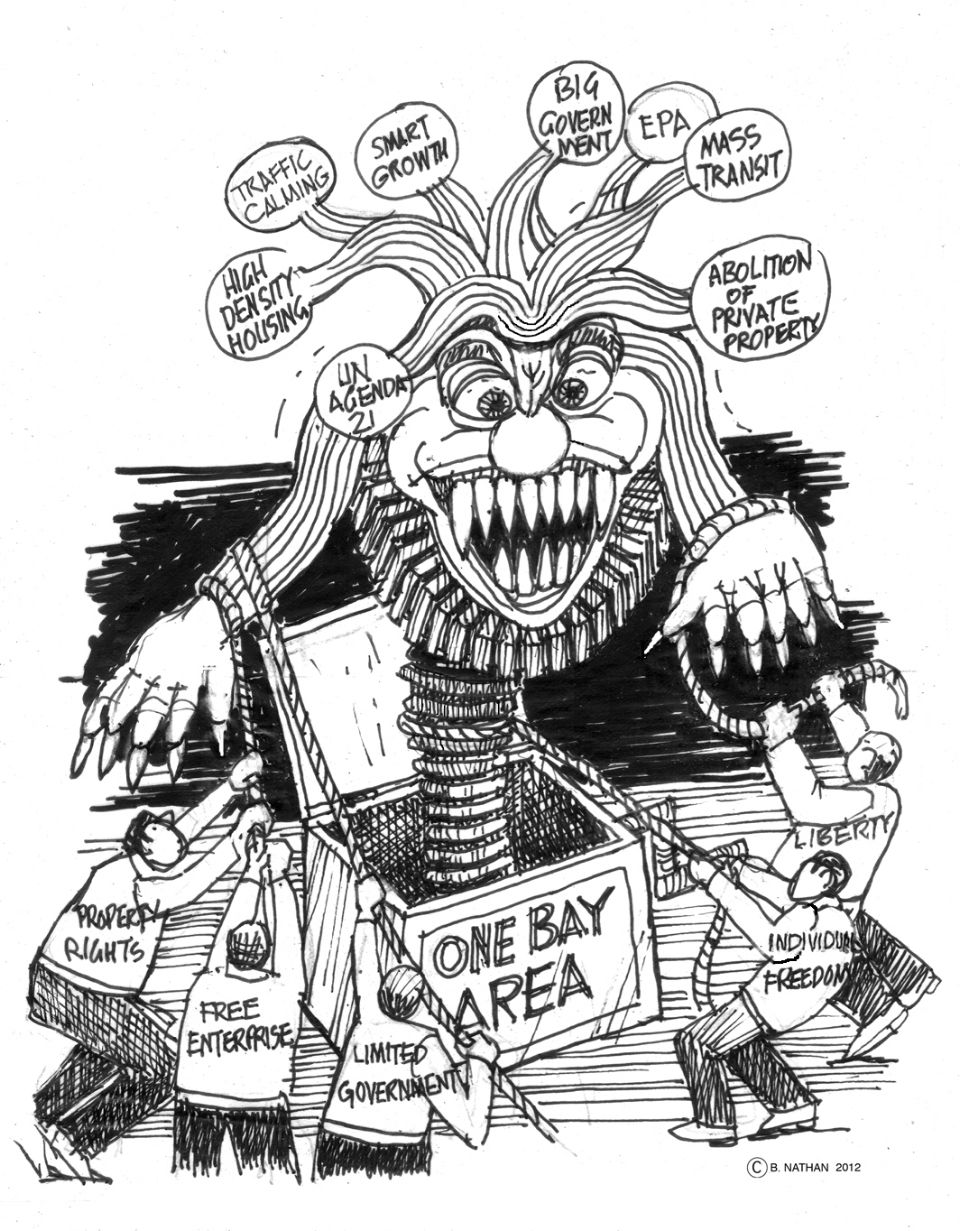
As someone who was very naïve about the political process as conducted by the regional authorities in the Bay Area, I was appalled by my experience at the two Spring 2011 One Bay Area visioning sessions that I attended. For those unfamiliar, with One Bay Area visioning, and consensus building, a brief explanation is in order.
One Bay Area, also known as Plan Bay Area, is a 25 year plan to design policies for growth that will take us from 2013 through to 2035. By law, the plan is required to get input from the public. I went to learn about the plan and to provide my input. Although the stated purpose was to get input, the reality proved quite different.
One Bay Area’s predetermined objective is to impose the template of sustainability and smart growth policies. The methodology for that imposition is the use of the Delphi Technique, developed by the RAND Corporation in the 1960s. The two code words associated with the technique are “visioning” and “consensus”. Visioning is the process that consists of a series of meetings led by a facilitator to get the participants to agree to a predetermined outcome. Consensus is the process through which objections to a proposal are extinguished. Consensus is not agreement. It is the absence of expressed opposition. For example, a typical goal might be “to preserve open space”. The facilitator does not ask the group to agree because that might provoke opposition. Questions such as how much open space, where would it be, how would it be acquired are not allowed. Instead, the facilitator asks a negative question. He might ask “Does anyone think we should not preserve open space?” Anyone who answers yes to this question would look ridiculous and be marginalized by the group. Negative response questions are designed to eliminate opposition. The sessions do not allow you to question assumptions. Here is a discussion of open space as it unfolded in a Spring 2011 visioning session. This is the opposite of representative government.
Since very few people knowingly would vote to subvert their property rights as guaranteed by Article V of the US Constitution, the federalized regional entities, Metropolitan Transportation Commission (MTC) and the Association of Bay Area Governments (ABAG) who sponsor the nine county One Bay Area Plan, and their enablers ( Silicon Valley Community Foundation, TransformCA, and Greenbelt Alliance) must resort to stealth and deception through the use of the Delphi Technique. Visioning and consensus are the tools in their toolbox to herd opinions to a predetermined outcome. Sounds unbelievable. Most people trust government. I did too. Several sessions were videotaped showing on the one hand, a (false) interest in our input and on the other, when we provided input, being shut down and ignored. This video is an edited composite of several sessions.
When we did question, we were given a time out and compared to the facilitator’s 5 year old child. How insulting!! Click here for the video.
Perhaps the final straw for me and the impetus for this article are the upcoming visioning sessions scheduled for January 2012. In the first set of sessions in Spring 2011, one just registered with name and contact information. In this upcoming round of sessions, after you provide your contact information a screen asking for “Affiliation” pops up. It asks you to choose between being an advocate for business interests, environmental interests, public health interests, reduced role for government, social justice interests, concerned individual, elected official, public section. Could it be that the organizers are trying to filter out any disagreement after the disaster of several Spring 2011 sessions? Why was the affiliation form required for this set of visioning sessions and not the Spring 2011 set? Are they trying to skew the attendance away from people who support limited government and are concerned citizens? I ask these questions because MTC has a policy committee for citizen input composed completely of social justice and environmental justice people (http://www.mtc.ca.gov/get_involved/advisory/ ) but there is no policy committee representing concerned citizens , limited government advocates, suburban or rural property owners, motor vehicle users, or business interests. Sounds pretty suspicious to me. Is this even legal to ask the affiliation of those attending a public meeting ? Is it legal to limit attendance.
The visioning sessions are scheduled to hold a maximum of 100 people per county or a total of 900 people. Even giving the organizers the benefit of the doubt about their intentions, one has to wonder if it is realistic to allow 900 people to make planning decisions that will have profound effect on the area over 25 years for the 7million people in the Bay Area. What happened to representative government? What happened to voting? What happened to honest and open debate?

I believe that MTC and ABAG owe the public an explanation for the deceptive practices of visioning and consensus. I am not an attorney, Mr. Heminger, but it seems to me that you and your agency are in serious violation of the Brown Act for public meetings. As Executive Director of MTC do you care to defend you actions? I eagerly await your response.
###
Listen to Barbara Simpson's KSFO show on One Bay Area (Mimi Steel comes on
around 27 minute mark)
More on One Bay Area and private property rights see http://www.bayarealiberty.com/index.html
Public Input or Kabuki Theater? Another Example of Suppression of Speech in the Bay Area by Mimi Steel (text originally published at http://capoliticalnews.com/).
This article is from Freedom Advocates
The link to the story is: http://www.freedomadvocates.org/articles/planning_-_smart_growth/public_input_or_kabuki_theater%3f_another_example_of_suppression_of_speech__20120112452/